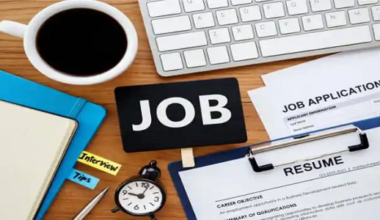Logistics have been around for centuries—more than 2,500 years. The art of logistics is the business of managing and coordinating resources. It includes managing everything from freight transportation to personnel movements. Today’s businesses are dependent on a steady flow of goods and services. Logisticians help keep that flow moving smoothly and efficiently within an organization or through outsourced networks.
Who is a Logistics Officer?
Logistics officers coordinate all aspects of the system, including procurement, warehousing, inventory management, shipping, and transportation management. They are responsible for helping companies manage costs. They make sure that deliveries arrive on time and that materials arrive as needed.
A logistics officer is responsible for managing the movement of supplies and equipment during combat operations. They are often responsible for supplying ammunition to units in the field and overseeing the transport of wounded soldiers to medical facilities. Logistics officers manage military resupply programs and may need to be present at ports as well as airfields when there is a break in transportation systems or disruptions to supply lines.
Logistics officers manage not only military assets but also civilian contractors who are hired by military agencies such as the Department of Defense or regional commands for logistics support. These contractors repair vehicles, rearm aircraft, load cargo containers, etc.
Who can Work as a Logistics Officer?
The category of people who can work as logistics officers includes:
- Air Force
- Army
- Marines
- Navy
- National Guard
- Coast Guard.
The position of logistics officer is a non-commissioned officer post with responsibility for executing the logistical plan of an organization. They are involved in all aspects of moving people, equipment, and supplies across land or seas to accomplish the tasks assigned to them by their superiors.
The logistics officer is responsible for planning long and short-term movements, managing transportation routes, and making sure that everything arrives at its destination on time. Logistics officers work independently but also work closely with other organizations, such as intelligence agencies, research centers, military commanders, or other organizations in any field that might need their help.
Responsibilities of a Logistics Officer
The following are the responsibilities of a logistics officer:
- Provide accurate, credible, and timely military logistics.
- interface with the five armed services (Army, Navy, Marines, Air Force, and Coast Guard) to ensure the proper response to any contingency.
- Understand the concepts of situational awareness and low-observable operations to raise readiness and operational capability.
- Interact with all other departments within a given unit for logistics support. This includes construction management, non-declared maintenance support, supply distribution, and personnel management support.
- Formulate and execute plans in accordance with established policies and procedures to meet urgent operational needs.
- Supervise subordinate logisticians to carry out the logistics portion of a military operation.
- Provide troops with quality of life issues such as morale, welfare, and recreation.
- Assist the commander in their duties as they pertain to logistical functions.
- Perform all other duties as may be assigned by the commander.
“The responsibilities of a logistics officer vary depending on their rank.”
As a logistics officer, you must plan and manage logistics transport for a company. You have to set up the route and carry out the transport for goods, including moving them within a factory, from one factory to another, or from one region of a country to another. A logistics officer is also responsible for reporting any accidents that occur during transport; this includes damage caused by equipment failures or natural phenomena like floods and earthquakes.
A typical day starts with planning what types of goods will be transported or where they are going next with other officers. By this time, the officers have already made the necessary arrangements for the transport of goods. The officer then needs to make sure that the goods are loaded in a safe and secure way. It is also essential for them to check that all paperwork related to their transports is done correctly. The officers also need to check what materials are being used in transporting goods. This means making sure that there is enough of every type of material being used so that the whole process does not get delayed or even stop!
Every item must be accounted for; it cannot be lost, damaged, or forgotten! However, accidents can happen even if there isn’t any negligence on the part of an officer.
Where can Logistics Officers Work?
Here are some places that logistics can work:
- Retail Stores
- Warehouses
- Shipping Companies
- Manufacturing Plants
- Oil Companies
- Gas Companies
- Transportation Companies
- Medical Centers
- Data Centers
- Public Transit Depots
- Libraries
- Banks
- “Telecommunications, Internet, and Online Media Corporations”
- Automotive Industries – International Freight Forwarders and Moving Companies
- Cargo Handling and Transportation Services: Railroads, Airports, Ports,
These are just some examples of where a logistics specialist can work. The possibilities are endless, and the salary ranges for logistics specialists vary depending on what you want to do with your career in logistics. It’s important to choose a field that is suited to you and your talents, so make sure that you check out the job listings! You’ll be glad you did!
Characteristics of a Logistics Officer
The characteristics of a logistics officer are:
- A strong aptitude for logistics or an interest in the field
- A patient personality
- The ability to work with a diverse array of people
- Good problem-solving skills
- an understanding of business operations, possibly using spreadsheets or computers to plan and manage the flow of goods.
- Understanding the need for flexibility in a fast-paced field
- familiarity with figures and numbers as well as adding, subtracting, multiplying, and dividing.
- Good communication skills
- ability to work early morning, evening, and weekend hours as needed.
- ability to work with minimal supervision
- Good customer service skills and customer problem-solving abilities
- a necessary option of transportation (such as a vehicle) based on the requirements of the assignment. A valid commercial driver’s license may be required; travel expenses may be paid.
Advantages of Working as a Logistics Officer
Here are some advantages to working as a logistics officer:
- You can have a job with the military, the federal or state government, or a private company.
- The median salary for logistics officers is around $62,000.
- You can work in one of many diverse and interesting occupation fields, such as logistics generalist, rail transportation specialist, or public transit system manager.
- You could work in supply chain management, coordinating different parts of the production process as they move from suppliers to warehouses, or you could transport goods by truck or plane.
- You can work in warehouses and distribution centers, travel to many different places within the country, and have many different situations and customers that you would not see in another occupation.
- You could be a part of a company’s HR department or customer service department.
- You have an opportunity to travel.
- The military can help you get benefits such as tuition reimbursement and travel allowances.
- There is time away from home for family when you are on duty or traveling for work, which is good for your family and enables them to feel comfortable with you being gone for long periods of time.
Logistics officers are responsible for planning and arranging the shipment of goods and materials between locations to meet customers’ needs.
Conclusion
A logistics officer’s job description has been designed to coordinate the deployment of resources, goods, and services. They are responsible for the release of materials, providing support systems, and maintaining supply chains.
Frequently Asked Questions
What are the duties of Logistics Officer?
Logistics Officers are responsible for monitoring stock levels and overseeing the movement of incoming and outgoing goods. They are detail–focused and use computers to manage the inventory databases under their control. They usually work in a storage facility for transport and logistics organisations.
What is qualifications for Logistics Officer?
Logistics Officer Requirements / Skills / Qualifications
- Bachelor’s degree in Logistics, Business administration, or Transportation; Industrial Distribution, Industrial Engineering, or Supply Chain Management, or in a related field.
- Work experience in logistic or supply chain management.
- Computer skills.
References
- https://www.seek.com.au/career-advice/role/logistics-officer
- https://www.jobhero.com/job-description/examples/logistics/officer
- https://climbtheladder.com/logistics-officer/#:~:text=Logistics%20officers%20are%20responsible%20for,time%20and%20in%20good%20condition.
- https://resources.workable.com/logistics-coordinator-job-description






